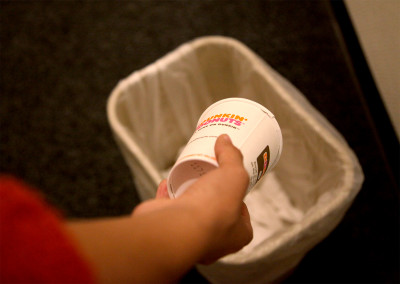
That afternoon latte costs a lot, but the paper cup it came in could be even costlier.
Challenging students to use reusable containers instead of paper cups at their favorite coffee shops around campus, the Net Impact Undergrad Chapter at Boston University will be promoting the Kill the Cup 2015 University Challenge until Nov. 13.
The University Challenge is a nationwide contest held between 16 different universities to see which school can get the most students to replace their usage of paper cups with plastic, glass or metal reusable ones.
At the end of the contest, which began Oct. 5, the winning college will be awarded a grant to fund a sustainability project of its choice.
Net Impact has been mainly advocating for the contest at the Starbucks located in the George Sherman Union. Club members approach students waiting in the coffee line and explain the challenge to them, offering a punch card towards a free coffee from any coffee shop on campus after nine purchases, or a free reusable cup if the student downloads the Kill the Cup app.
The cup itself is a marketing tool for the challenge. It lists important social media information for anyone who wants to get involved, all while sporting the campaign’s trademark bright green color to remind students to grab the cup on their way out of their dorm.
Along with the incentive of a 25-cent discount off of every drink ordered with a reusable cup, the campaign seeks to increase general awareness among the BU community about the importance of incorporating environmentally friendly habits into everyday life.
Marissa LaFave, a senior in the College of Arts and Sciences and the president of BU’s Net Impact chapter, expressed the environmental goals of the campaign.
“Last year, at just the GSU Starbucks, 1.2 million paper cups were thrown out,” she said. “That’s a lot of paper cup waste, and we’re really trying to reduce it.”
LaFave pointed out that while the GSU does recycle paper cups, most Starbucks locations across the country are unable to recycle paper coffee cups because they contain a special heat-resistant plastic lining that makes it difficult for recycling centers to process the cups. Kill the Cup’s focus on reusable mugs seems to be successfully working towards eliminating this problem, LaFave said.
“We have seen people using our mugs again, which is pretty awesome,” she said.
Despite a some pushback from students who are reluctant to change the easy habit of throwing away a paper cup, Net Impact’s members said they remain optimistic about the positive impact the contest will have.
“People are seeing the bright green mugs and it’s getting them more interested [in sustainability],” LaFave said.
Alex Wong, a senior in the Questrom School of Business and the treasurer of Net Impact, said it helps that BU has a strong foundation in its commitment to being environmentally friendly.
“I also work for sustainability@BU, so I feel like [the administration] is very sustainable,” Wong said. “There are a lot of things going on in the background where they try to make their operations and different processes more sustainable. But this dedication to sustainability is maybe not coming from the student body as much.”
Callie Ahlgrim, a junior in both CAS and the College of Communication and a new supporter of the campaign, agreed that many BU students lack an awareness and enthusiasm for being environmentally conscious.
“I think that being lazy comes into play a lot when people try to recycle or be sustainable,” Ahlgrim said. “I can be guilty of that myself, and that’s why I appreciate the efforts on campus to make it easier and more available to reduce unsustainable behavior. BU is definitely committed to sustainability, and that shows.”
LaFave said she is confident that Net Impact will be able to gather more support from students next year.
“I think that if we attract people who do truly care about sustainability,” she said, “we will make a larger difference in the long term rather than just the short term of the campaign.”



























































































































